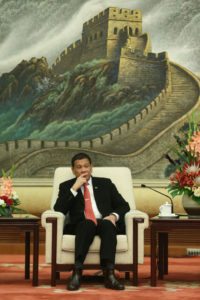THE pronouncement of President Rodrigo Duterte on a military and economic “separation” from the United States should not be viewed as a total break of ties between Manila and Washington but more of a move to rebalance the relationship of the Philippines with other nations, a political analyst said Friday.
Ramon Casiple of the Institute for Political and Electoral Reform said the President just wanted to put an end to the “special relations” between the Philippines and the US, which had been more beneficial to the latter.
While Washington has been saying that it has a deep relationship with the Philippines, the country has not been getting fair treatment, Casiple said.
He cited the strict US visa requirements imposed on Filipinos, which was mentioned by Duterte during his speech before the Filipino community in Beijing on Wednesday.
Filipinos, he noted, have to undergo a strict and expensive US visa process with a high chance of being denied, while US passport holders can enter the Philippines visa-free.
Casiple also cited the special treatment accorded to US military personnel who have committed crimes in the Philippines, who are put under the custody of the US embassy in Manila instead of being detained in regular jails.
“The President wants to put an end to these,” he said.
“The US should treat us as equals and without the mutually agreed privileges wherein they will impose something and we will follow,” the political analyst added.
Casiple said the announcement was not surprising considering the President had made similar announcements in the past.
He added that there should be no negative effects on the country’s economic relations with the US, noting that
US companies were earning profits in the Philippines and would not pull their business out just because relations between Manila and Washington have turned sour.
Betrayal?
Some senators questioned the “earth-shaking foreign policy overhaul” of Duterte that seemed to have not undergone a thorough study and was kept secret from the public.
Senate Minority Leader Ralph Recto said foreign policy should be well-thought and not simply blurted out.
While Recto admitted that the country’s relationship with US was not perfect, a country that had illegally built a “great wall of sand” within the Philippines’ territorial waters—China—was far from the epitome of a good friend either.
“By all means, let us push all the reboot buttons with all countries but without having to blast to pieces some of the good relations our nation has nurtured for generations,” he added.
As to joining Russia and China in a “new axis,” Recto said, the Duterte administration should fix the country’s traffic problems first before joining in the power games of nuclear states.
Senator Leila de Lima, the President’s arch-nemesis, said the decision of Duterte to keep his announcement from the Filipino people and reveal it first in a foreign land was a betrayal.
“Why did he choose to make a huge announcement in a foreign visit? It’s one thing to keep your Cabinet members in the dark—which is deeply troubling in itself —but it’s a whole level of betrayal to keep that from the Filipino people, and to announce it for the first time in front of foreigners,” de Lima said.



